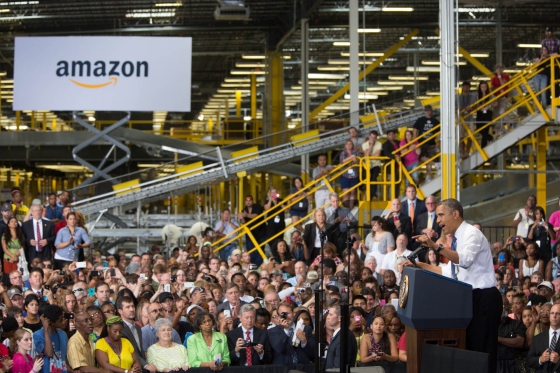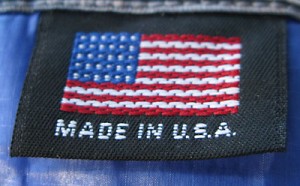Lakishka Raybon hunches over her work station, ear buds tucked neatly in place. With a pair of tweezers in one hand and a stylus in the other, she carefully lifts each tiny component from a tray and delicately places it inside the quarter-sized circle that will soon become a wristwatch. It takes intense concentration and a steady hand, but it sure beats her last job, assembling bumpers for cars.
Reposted from Forbes:
“You come in clean and you get to leave clean,” said the 35-year-old suburban Detroit resident, who spent nine and a half years working for an automotive supplier. In that job, she said, “there was grease everywhere.”
Watch-making in the United States is a lost art, save for a handful of high-end custom watch builders. The last American watch company, Hamilton, was bought by a Swiss watchmaker in 1971 and moved from Pennsylvania to Switzerland in 2003. Indeed, most watches today come from Asia or Switzerland.
But here in bankrupt Detroit, Tom Kartsotis, a wealthy entrepreneur who thinks American manufacturing still has a future, is creating a watch company from scratch in a city that knows a thing or two about manufacturing.
The company says it expects to produce 45,000 watches this year, and up to 500,000 annually by 2014 or 2015. With an average price of $600 apiece, Shinola watches are now sold at Barney’s, Saks, Neiman Marcus, Bloomingdales and Nordstrom. Besides watches, Shinola also sells $2,000 custom-built bicycles and leather goods, all with an American pedigree. It’s also producing limited edition watches under licensing agreements with other brands, such as Ford Motor, which plans to sell a Shinola-built watch to commemorate next year’s launch of the 50th anniversary Ford Mustang.
Last month Shinola opened two retail locations, one in Detroit’s vibrant Midtown neighborhood and another in New York’s Tribeca neighborhood.
There have been growing pains, however. Shinola’s first batch of 2,500 watches – a special edition priced at $550 — sold out on the web in eight days. Unfortunately, many of those customers are still waiting for their watches because of early production snafus.
Shinola, which now has more than 100 employees, admits it has gotten a little ahead of itself in launching the brand, which included a recent full page ad in The New York Times. “This early demand is applying a tremendous amount of pressure on a young company that is trying to do something that’s never been done quite like this before, and we have to ask for your patience,” according to a blog post on Shinola’s web site this week. “At some point we are certain we will be able to catch up with demand but, for now, this is a pretty wild ride.” The company says those limited edition watches are being shipped this month.
Kartsotis, 53, is best known for founding Fossil, the popular accessories brand. He was CEO from the start in 1984 until 2000, and remained chairman until 2010 while gradually reducing his stake to less than 5 percent. His brother, Kosta, now runs the Richardson, Texas, company.
Since then, Tom Kartsotis, whose last-reported Fossil holdings are worth an estimated $320 million, has been pouring most of his resources into his venture capital firm, Bedrock. It invests in U.S.-based manufacturers like Seattle-based Filson, the 116-year-old outdoor clothing company it bought last year.
In the case of Shinola, however, Kartsotis is launching a new company under a brand made famous for shoe polish. The original Shinola brand was founded in 1907, and gained notoriety during World War I, when a disgruntled young soldier was said to have shined his commander’s boots with feces. The rumor led to the popular colloquialism, “You don’t know sh*t from Shinola.”
After one of Bedrock’s managers made the crack to an office colleague, the joke turned to a serious discussion about restoring the long-idled Shinola brand, whose trademark, it turned out, was available.
“We wanted to create an accessory company – mostly watches and leather goods – and create a ‘Made in the USA’ story,” said Bedrock chief executive Heath Carr, who left Fossil to run the investment company for Kartsotis a year and a half ago. “We’re very bullish on the U.S., first off, and two, it would be a differentiator in the marketplace.”
But why Detroit, a city so broke it can’t afford to provide even the most basic services to its shrunken population? Carr says a better question is, “Why not?”
“I don’t pretend Detroit doesn’t have challenges,” said Carr, who remains based in Dallas while leaving Shinola’s day-to-day management to CEO Steve Bock. “There’s no hiding that. But there’s such an energy there. It’s wildly contagious.”
And with no established workforce for watch-making in the U.S., Detroit was as good a place as any to start the company, he said. Its manufacturing heritage would lend a degree of authenticity to Shinola products, the company figured.
To see if that hunch was right, Bedrock commissioned a focus group and asked participants whether they preferred a $5 pen from China, a $10 pen made in the USA or a $15 pen made in Detroit. People preferred the cheaper Chinese pen, but were willing to pay the higher premium for one made in Detroit. That was a signal that consumers would pay for an authentic American-made watch and that Detroit’s reputation as an industrial leader was still intact, despite its well-publicized woes.
So in late 2011, Bedrock officials visited Detroit to search for a manufacturing site. Their trip included a visit to the Industrial Design school at the College for Creative Studies, which took over GM’s former research lab a few years ago. By chance, the elevator in the 12-story building stopped unexpectedly on the fifth floor, which was vacant. “We stuck our heads out and said, ‘What about this space?’” Carr recalled. “We had seen buildings earlier in the day but it would have been a multi-year process to do all the remodeling. This space was fairly clean and ready to go and so we were able to advance our timeline pretty significantly.”
Bedrock knew nothing about watch-making, however, so it sought help from Ronda, a Swiss watch-maker, to design the factory, install the equipment and teach employees the fine points of watch assembly.
Shinola’s watch movements require 46 individual pieces – tiny coils, springs and wheels – that are so small that employees sitting inches from their work must use magnifying loupes and tweezers, vacuum styluses and micro-screwdrivers to assemble them. Using a kit of parts made by Ronda in Switzerland, each Shinola technician adds a few parts to the movement before passing it to the next station. Along the way, workers perform multiple quality checks to make sure the parts are well-lubricated and working together properly. Each batch of movements is checked for precision by a certified watchmaker.
Once the movement is built, the remainder of the watch takes shape: setting the dial and the hands, assembling the watch case, adding the crown, closing the case back or crystal and adding the leather straps. Then, each watch is tested again for time-keeping accuracy, quality and waterproofing.
Carr said Shinola relies on the help of a small band
of
American craftsmen, who were not easy to find. “We were naïve about the manufacturing process in the U.S.,” said Carr. “A lot more manufacturing had gone overseas than we originally anticipated.”
Eventually, however, Bedrock was able to identify a handful of suppliers still manufacturing handcrafted materials in the U.S. Chicago’s last leather tannery, Horween, for example, supplies the vegetable-tanned leather for Shinola’s products. That leather is then sewn into watchbands, journals and other leather goods by a small manufacturer in Saint Genevieve, Mo., called Eric Scott. Edwards Brothers Malloy, a specialty paper manufacturer in Ann Arbor, Mich., makes recycled paper for the journals. Bicycle frames are made by hand by a Wisconsin company called Waterford Precision Cycles, then shipped to Detroit for assembly.
Even hiring a master watchmaker proved difficult until Shinola found Stefan Mihoc, a Romanian immigrant who had been working as a machinist in the Detroit area for more than a decade because there were no watch-making jobs in America when he arrived in the late 1980s. Now Shinola has two master watchmakers.
The city’s bankruptcy filing is only a minor concern, said Carr. “I think it’s difficult for people to live in a bankrupt city. If people are not living there, you don’t have a workforce,” he said. But Shinola didn’t take a penny of incentives to locate in the city. “We’re in Detroit because we fell in love with Detroit,” he said. “You can’t wait for city government to give you better direction. As a business, you’ve got to move. Detroit has a lot of challenges, but that makes it an interesting place to be. It’s almost like it drives the business folks harder. That’s the energy.”











